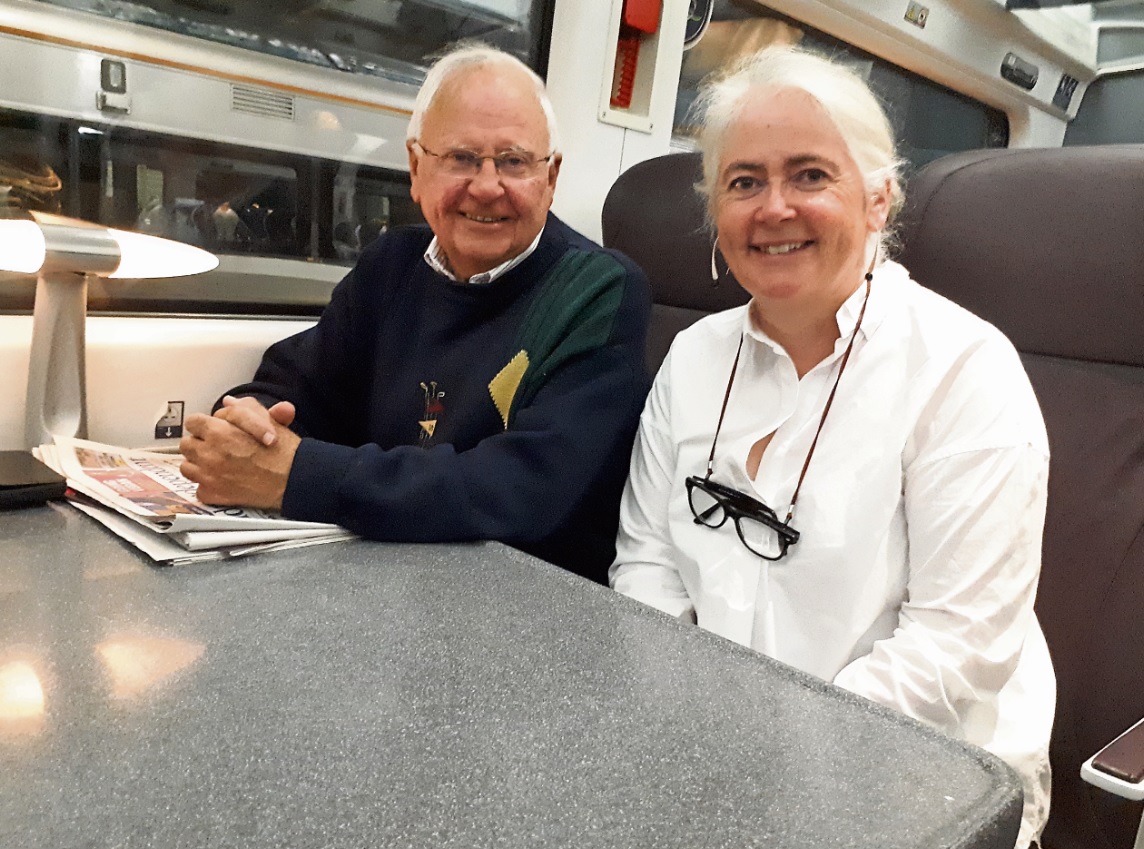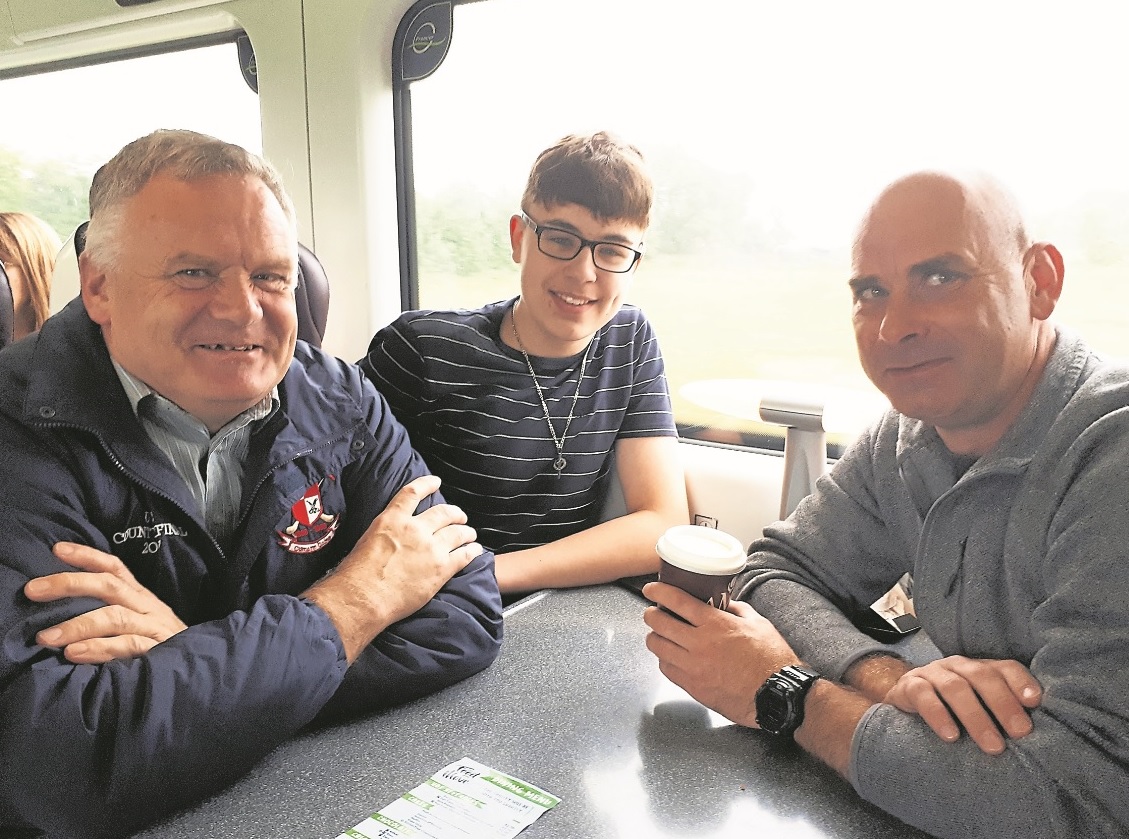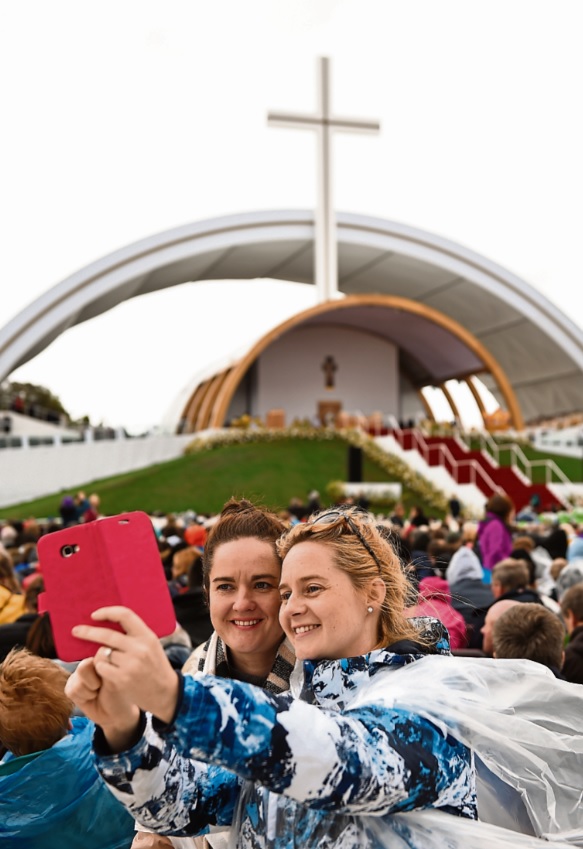
Pope Francis arrives prior to the commencement of the closing Mass of his Ireland visit at the Phoenix Park Picture: Brendan Moran/Sportsfile
THIS TIME ROUND, there is no pontificate presence in the remains of Greenpark. There is no special supplement to celebrate the Holy See.
There is no pilgrimage of families bingeing on chips from makeshift street vendors en route to His Holiness. There is no fight for the front row seat, just to inhale the same damp air as the chalice.
And there is no number close to the inspired masses who watched Pope John Paul II orate to some 400,000.
“I wonder how many people would turn up today if the Pope decided to come to Limerick? Nothing near that figure, I would venture,” wrote my editor Eugene Phelan in 2009, in a piece commemorating the 30th anniversary of the pontiff’s visit to Limerick, an event he covered as a junior reporter for this newspaper.
Back then, as he described it, the Catholic Church was king.
If the Saint had sneezed or missed a line in a psalm, the Catholic Ireland of ‘79 would have unconditionally applauded the man.
In 2018 a new Ireland awaited the Pope ready to confront the Vatican on atrocities that shamed a nation.
No other Pope has ever faced this corrosive PR quandary, particularly during a triennial festival that celebrates the spirituality of family and community - two fabrics of Catholic Ireland’s tapestry that had frayed at the seams in recent years.
The Leader, 39 years ago, had a phalanx of reporters on duty from 1am at Greenpark. As for me, well, I am alone on the quiet 8.25am train to Heuston Station, trying to decipher how the sequel to 1979 will be written.
Everyone in this cabin is Dublin-bound to see Pope Francis deliver his final address as part of the World Meeting of Families festivities.
Other than a small choir of women practising their hymns and a trio of men reminiscing on last week’s hurling victory, the room is filled with the nice ambience of the chucking tracks and the newspaper crinkle from a nearby cubicle.
Sitting across the way is Sheila Deegan and her father Paddy Deegan, neither of whom are new to the sight of the pontiff.
Sheila, Limerick City and County Council’s arts and culture officer, met Pope John Paul II five months before she attended his Mass in October 1979.
Her father, who is the same age as Pope Francis (81), has one up on her. Not only did he see JP in 1979, when he was a boy scout, he attended a Mass in Rome delivered by Pope Pius XII. Six popes before this one.

This trip, however, almost didn’t happen for the Clareview man. When it was announced that Francis was to visit Ireland, he thought he was “too old” to endure the lengthy walk from the station to the Phoenix Park.
“I decided anyway, for a finish, there was so much criticism, I felt, he needed a bit of support, you know?” he says. His daughter adds that they were fortunate to secure seats.
“I rang up the Vatican and I said…” she quips.
Sitting behind them is Senan Ryan, who remembers - as a steward - the sea of littered lunch boxes at JP’s visit to Limerick. He didn’t think much of the Mass, he admits, but he grew to adore the Pope in later years.
And what are his thoughts on Francis? “I am warming to this man very well, and I think he is going to be tremendous.”
Senan is with young David Burke from Caherdavin and his uncle Rory Bennis from North Circular Road.

Rory, son of well-known activist Nora Bennis, says today is a “once in a lifetime opportunity”. Very much like Limerick winning the All-Ireland, he says, which he watched from the Gaelic Grounds.
The conversation drifts to Francis’ unenviable task in addressing the abuse scandal, as protests have been taking place since people started hoovering up tickets just to boycott the Phoenix Park event.
Senan reckons the more that’s uncovered, the better.
“It will end up making the Church stronger. Unfortunately, I think the Church will become weaker before it becomes stronger. And we still have a way to go,” he opines.
Rory adds: “You have to remember too now, the Church only started off with 12 people. There’s something like 1.2 billion now. So if it does fall again, it will grow again after.”
David, 15, wearing a silver cross, says more young people need to attend Mass in order to ensure its future.
Chrissie Lewis, a candid Knockainey woman, shares a similar sentiment. She takes the window seat with her sister Margaret and brother-in-law Peter Hennessy, from Kilmallock.
At the start, Peter is the lead speaker, and Chrissie the reserved observer. But once probed about the Church’s future, she waxes lyrical with her views.
“You’d have young people doing their Leaving Cert, and they’d say: ‘I am doing my Leaving Cert tomorrow Chrissie, will you go to Mass and light a candle for me and say a prayer.’ Now, if it was me doing my Leaving Cert, I’d be there every day. You won’t see any one of them come to light a candle for their Leaving Cert.”
Priests should also be given the choice to get married, she tells this reporter who is then signalled by Peter.
“But for a lot of the priests, it’s a lonely life. A lot of them have the same social problems as the rest of us - drink, everything, you know? Even the years gone by, they had the housekeepers, but they don’t have the housekeepers. Once they close the door, they may not see someone for the day.”
Peter and Margaret are attending Pope Francis’ Mass in memory of her dad, Dan Foley, who cycled all the way from Knockainey to see JP’s closing Mass in Greenpark. He would have turned 100 next April.
The joyous couple are already partied out. They were at Croke Park for Limerick’s All-Ireland victory, and Liam MacCarthy fever boiled in their blood as they attended the homecomings in Galbally, Kilmallock and the Gaelic Grounds.
“We kind of have enough of it now. We don’t know what to do next, go to Electric Picnic or something?”
Peter attended the ‘79 Mass, but wasn’t one of the 400,000 spectators. He was carrying out popemobile security duties as part of an army apprentice programme.
What was it like being so close to a Saint?
“Well,” he replies, “I was more worried about being under his front wheel than anything else.”
It seems like Pat C Fitzgerald, from Croom, was the only Limerick person to not have attended Pope John Paul’s Mass. He was in America at the time. A “middle of the road” follower, he says with a smile.
The ex-councillor, who is with his wife Mary and Croom woman Noreen O’Regan, says he hopes the Church can “hold its strength” during its current ordeal.
He adds that the Church’s positive impact is “inclined to be forgotten”.
“You have the foundation of the State and the role it had in churches, schools and hospitals and the voluntary work they would have done.”
As if the train had just left a minute ago, it now docks at Heuston Station. I guess time flies when you’re plunged into rabbit-hole discussions about the papacy and religion.
I’m not following the crowd to the Phoenix Park, a walk of around 30 minutes. Instead I travel eastwards to Dublin Castle in order to receive my golden ticket to the media centre.
From there, I hop on the journalists’ chariot - a double-decker Dublin Bus - and we are escorted to Phoenix Park. A Cork journalist tells me there is an armed detective aboard. It’s believable, considering a motorcade of gardai are clearing the route for us, sirens screaming, from Dame Street, through Dorset Street and on to North Circular Road.
As the bus enters the grounds, revellers wave the gold and white colours of the Vatican, exuberant despite the foreshadowing, grey overcast and hazy drizzle.
If you take the Pope out of the picture, it’s like the start of a mucky weekend in Stradbally, minus the cans of Dutch being confiscated by gardai. Not saying that didn’t happen.
The media centre is a humid marquee, clogged with hundreds of journalists from nearly every major newsroom across the planet. Into its final day, the World Meeting of Families celebrations is dominated by global headlines on the Pope’s recognition of historical abuse, and the call for his resignation by the ex-papal nuncio.
The feeling outside among the ebullient worshippers flooding into the grounds is different, especially with Daniel O’Donnell on stage, fortifying that today is the most Catholic day in Ireland this millennium so far.
At 2pm, there are estimates that fewer than 130,000 people have attended the Mass, a far cry from the Greenpark Mass and the Phoenix Park Mass of ‘79, when there were one million gazing up at the pontiff.
Before Francis arrives in the famous popemobile, the Papal Mass Choir gives a melodious performance that resonates through the vast landscape of Phoenix Park, as if the spirit of Mahler’s Symphony of a Thousand was conducting the stage.
Then the brass fanfare ensues. The octogenarian cruises through an estuary of fans who are almost willing to dislocate their shoulders to get that extended reach for his dove-white garments.
And as he steps on the stage, below the papal cross and above a tuft of green and white flowers, Pope Francis is then clad with an emerald, silk cassock. Must be a fan of St Patrick, I hear a UK reporter chirp.
After Archbishop Diarmuid Martin delivers the introductory speech, the pontiff, through a translator, begins his final address.
However, the echo of the translator rambles over his Spanish, reverberating over the sound of the speech that is being broadcast on RTE in the media centre, prompting a fleet of nonplussed journalists.
“Did he say ‘abuse’? Am I hearing ‘forgiveness’? I can’t hear anything,” a swarm of reporters struggle to comprehend the palaver of what’s happening, as we realise that Pope Francis has lunged into an off-script speech, begging for the Church’s pardon over decades of abuse.
“We ask forgiveness for the abuses in Ireland, abuses of power, of conscience, and sexual abuses perpetrated by members with roles of responsibility in the church.
“In a special way, we ask pardon for all the abuses committed in various types of institutions run by males or female religious and by other members of the church, and we ask for forgiveness for those cases of manual work that so many young women and men were subjected to. We ask for forgiveness.
“We ask forgiveness for the times that, as a church, we did not show the survivors of whatever kind of abuse the compassion and the seeking of justice and truth through concrete actions. We ask for forgiveness.
“We ask for forgiveness for some of the church hierarchy who did not take charge of these situations and kept quiet. We ask for forgiveness.
“We ask for forgiveness for all those times in which many single mothers were told that to seek their children who had been separated from them - and the same being said to daughters and sons themselves - that this was a mortal sin. This is not a mortal sin,” the pope said. And with every pause came a gargantuan reply of applause and cheer.

In the final moments of his oration in Greenpark, Pope John Paul II was encouraging mothers and fathers to continue to encourage their sons to enter priesthood. Now, the head of the Vatican was ending his three-day visit by penitentially seeking forgiveness for the actions of Irish priests.
Two hours before he is to address Ireland’s top bishops, including our own Bishop Brendan Leahy, on the repair of the Church over the abuse scandal, Pope Francis succinctly concludes his surprise address:
“Give us the strength to work for justice. Amen.”
Subscribe or register today to discover more from DonegalLive.ie
Buy the e-paper of the Donegal Democrat, Donegal People's Press, Donegal Post and Inish Times here for instant access to Donegal's premier news titles.
Keep up with the latest news from Donegal with our daily newsletter featuring the most important stories of the day delivered to your inbox every evening at 5pm.